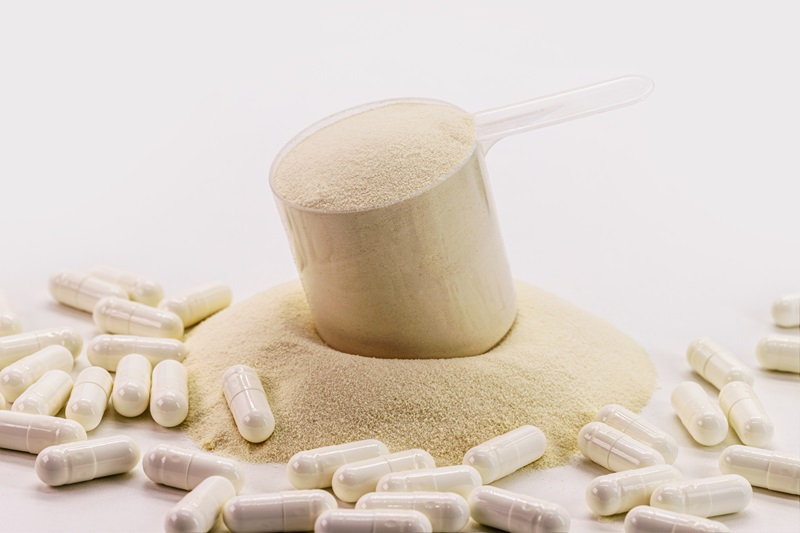Hunger hormones like GLP-1 play a key role in controlling appetite and digestion, helping you feel satisfied after eating. While there are various ways to influence these hormones, you can naturally support and manage them through food, lifestyle habits and supplements. Let’s explore how you can take a balanced, natural approach to managing hunger and promoting overall well-being.
Understanding Hunger Hormones
Your body regulates appetite through several key hormones. Each plays a different role in telling your body when it’s time to start (or stop eating) and can impact the types of foods you crave.
- Ghrelin: The “hunger hormone” that signals when it’s time to eat.
- Leptin: A hormone found in body fat cells that helps your body regulate energy intake and metabolism.
- GLP-1 and PYY: Gut hormones that slow digestion and increase satiety.
- Insulin helps regulate blood sugar. When blood sugar levels spike and crash, they can lead to cravings and overeating.
What you eat, how much you sleep and even how active you are can all impact these hormones. Making a few tweaks to your routine can help keep hunger under control.
Natural Strategies to Manage Hunger Hormones
1. Prioritize Protein

Eating enough protein is one effective way to regulate hunger hormones. Studies show that a high-protein meal increases GLP-1 and PYY, which tell your brain you’ve had enough to eat while lowering ghrelin, the hormone that makes you feel hungry.
Protein can also help stabilize blood sugar, preventing energy crashes that lead to cravings. So, if you often feel starving shortly after eating, adding more protein to your meals and snacks can be a good solution.
Aim for at least 20 to 35 grams of protein per meal and 10 to 20 grams per snack. Some easy ways to get more:
- Eggs
- Greek yogurt
- Chicken or turkey
- Fish
- Tofu or tempeh
- Beans and lentils
If you have trouble hitting your protein goals, a protein shake or bar can help. Nutrisystem’s high-protein meal plans can also make boosting your protein intake for weight loss more convenient.
2. Eat More Fiber

Fiber slows digestion and helps regulate blood sugar, keeping hunger in check. But not all fiber works the same way.
- Soluble fiber, found in oats, bananas, asparagus and beans, may help lower ghrelin and increase satiety hormones, according to research.
- Insoluble fiber, found in whole grains and vegetables, supports digestion but has mixed effects on hunger.
Adding soluble fiber-rich foods to meals and snacks, especially during times when you tend to feel hungrier, can help keep cravings in check. Some easy ways to get more fiber:
- Have a banana and peanut butter afternoon snack
- Start your day with oatmeal to keep you full through the morning
- Add beans to your soups or chilis.
Aim for 25 to 35 grams of fiber per day.
3. Get Enough Sleep

A bad night of sleep can disrupt your hunger hormones balance. Ghrelin levels rise, making you hungrier, while leptin drops, making it harder to feel full.
Lack of sleep also affects blood sugar, leading to insulin resistance and increased cravings, especially for high-carb, high-fat foods. Research shows all it takes is one night of poor sleep to make you overeat the next day.
To get better sleep, try:
- Keeping a consistent bedtime
- Reducing screen time before bed
- Sleeping in a cool, dark room
Getting 7 to 9 hours of sleep per night is needed for most people.
4. Exercise Regularly

Ever notice you’re less hungry after a good workout? That’s because exercise lowers ghrelin and increases GLP-1 and PYY, helping you feel fuller longer.
Aerobic exercise, like walking, running or cycling, seems to have the biggest effect on appetite control. Strength training helps, too, especially when combined with cardio.
Regular movement also improves leptin sensitivity, helping your body regulate hunger signals more effectively over time. So, try a quick walk or workout next time a craving hits. You might find you don’t need that snack after all!
5. Choose Healthy Fats

Dietary fats can help slow digestion, blunt blood sugar spikes and boost the release of fullness hormones. While it’s not entirely clear whether these effects directly reduce cravings and hunger, they may help. Plus, healthy fats add essential nutrients and enhance the flavor of meals, which can improve overall satisfaction.
Some of the best sources include:
- Avocados
- Nuts and seeds
- Fatty fish like salmon and sardines
- Olive oil
Adding small amounts of healthy fats, like a handful of nuts or a drizzle of olive oil, may be all you need to bulk up your meals and prevent hunger pangs.
6. Stay Hydrated

Sometimes, thirst feels like hunger. If you aren’t drinking enough water, you may find yourself snacking more than necessary.
Starting your meals with a glass of water can help reduce calorie intake. Herbal teas and water-rich foods, like cucumbers and watermelon, can also help with hydration.
A good target is at least 64 ounces of water daily, or more if you are active.
7. Consider Targeted Supplements

Some supplements may support hunger hormone balance. It’s not clear yet how helpful they are, but the results are interesting. They include:
- Berberine is a compound found in various plants. In supplement form, it might help improve blood sugar management and boost GLP-1.
- Psyllium Husk: A fiber found in products like Metamucil and Benefiber may help slow digestion and prolong feelings of fullness.
- Magnesium and Zinc are nutrients that may help manage blood sugars.
Always check with a healthcare provider before adding new supplements, especially if you take medications.
Take Control of Hunger and Stay on Track
Ultimately, controlling hunger, cravings and “food noise” can greatly impact your success. By making targeted diet and lifestyle adjustments, you can effectively regulate your appetite. Consider where and how hunger specifically affects you and see which of these natural strategies can help you quiet the “food noise” and stay focused on your progress.
References
- Zhang M, Zhu L, Wu G, Zhang H, Wang X, Qi X. The impacts and mechanisms of dietary proteins on glucose homeostasis and food intake: a pivotal role of gut hormones. Critical Reviews in Food Science and Nutrition. Published online October 6, 2023:1-15. doi:https://doi.org/10.1080/10408398.2023.2256400
- Ghazzawi HA, Mustafa S. Effect of high-protein breakfast meal on within-day appetite hormones: Peptide YY, glucagon-like peptide-1 in adults. Clinical Nutrition Experimental. Published online September 2019. doi:https://doi.org/10.1016/j.yclnex.2019.09.002
- Kohanmoo A, Faghih S, Akhlaghi M. Effect of short- and long-term protein consumption on appetite and appetite-regulating gastrointestinal hormones, a systematic review and meta-analysis of randomized controlled trials. Physiology & Behavior. 2020;226:113123. doi:https://doi.org/10.1016/j.physbeh.2020.113123
- Kabisch S, Weickert MO, Pfeiffer AFH. The role of cereal soluble fiber in the beneficial modulation of glycometabolic gastrointestinal hormones. Critical Reviews in Food Science and Nutrition. Published online November 16, 2022:1-17. doi:https://doi.org/10.1080/10408398.2022.2141190
- Birkeland E, Gharagozlian S, Birkeland KI, Holm OKS, Thorsby PM, Aas AM. Effect of inulin-type fructans on appetite in patients with type 2 diabetes: a randomised controlled crossover trial. Journal of Nutritional Science. 2021;10. doi:https://doi.org/10.1017/jns.2021.70
- Reutrakul S, Van Cauter E. Sleep influences on obesity, insulin resistance, and risk of type 2 diabetes. Metabolism. 2018;84(84):56-66. doi:https://doi.org/10.1016/j.metabol.2018.02.010
- Daza EJ, Wac K, Oppezzo M. Effects of Sleep Deprivation on Blood Glucose, Food Cravings, and Affect in a Non-Diabetic: An N-of-1 Randomized Pilot Study. Healthcare. 2019;8(1):6. doi:https://doi.org/10.3390/healthcare8010006
- Thackray AE, Stensel DJ. The impact of acute exercise on appetite control: Current insights and future perspectives. Appetite. Published online April 2023:106557. doi:https://doi.org/10.1016/j.appet.2023.106557
- Broom DR, Batterham RL, King JA, Stensel DJ. Influence of resistance and aerobic exercise on hunger, circulating levels of acylated ghrelin, and peptide YY in healthy males. American Journal of Physiology-Regulatory, Integrative and Comparative Physiology. 2009;296(1):R29-R35. doi:https://doi.org/10.1152/ajpregu.90706.2008
- Brindusa Ilinca Mitoiu, Nartea R, Roxana Steliana Miclaus. Impact of Resistance and Endurance Training on Ghrelin and Plasma Leptin Levels in Overweight and Obese Subjects. International Journal of Molecular Sciences. 2024;25(15):8067-8067. doi:https://doi.org/10.3390/ijms25158067
- Kaviani S, Cooper JA. Appetite responses to high-fat meals or diets of varying fatty acid composition: a comprehensive review. European Journal of Clinical Nutrition. 2017;71(10):1154-1165. doi:https://doi.org/10.1038/ejcn.2016.250
- Jeong JN. Effect of pre-meal water consumption on energy intake and satiety in non-obese young adults. Clinical Nutrition Research. 2018;7(4):291. doi:https://doi.org/10.7762/cnr.2018.7.4.291
- Mostafa Araj-Khodaei, Mohammad Hossein Ayati, Akbar Azizi Zeinalhajlou, et al. Berberine-induced glucagon-like peptide-1 and its mechanism for controlling type 2 diabetes mellitus: a comprehensive pathway review. Archives of Physiology and Biochemistry. Published online November 3, 2023:1-8. doi:https://doi.org/10.1080/13813455.2023.2258559
- Martellet MC, Majolo F, Ducati RG, Volken de Souza CF, Goettert MI. Probiotic applications associated with Psyllium fiber as prebiotics geared to a healthy intestinal microbiota: A review. Nutrition. 2022;103-104:111772. doi:https://doi.org/10.1016/j.nut.2022.111772
- Hamedifard Z, Farrokhian A, Reiner Ž, et al. The effects of combined magnesium and zinc supplementation on metabolic status in patients with type 2 diabetes mellitus and coronary heart disease. Lipids in Health and Disease. 2020;19(1). doi:https://doi.org/10.1186/s12944-020-01298-4

